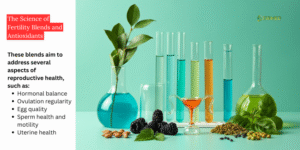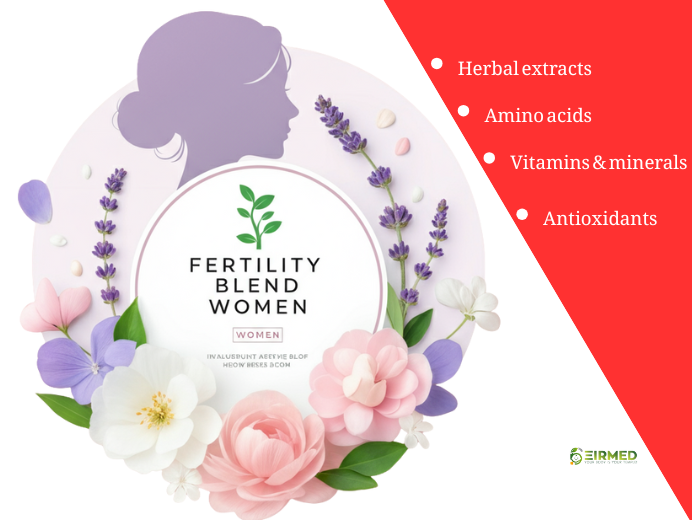Science Help: Understanding Fertility Blend for Women (Which Pills Really Work?)
What is a Fertility Blend for Women?
A fertility blend for women is a dietary supplement formulated to support female reproductive health and improve the chances of conception. It typically combines:
-
Herbal extracts (for example, Vitex agnus‑castus, aka Chasteberry)
-
Amino acids (e.g., L-arginine)
-
Vitamins & minerals (folic acid, B6, B12, iron, zinc, selenium, vitamin E)
-
Antioxidants (green tea extract, selenium)
One well-known product is Fertility Blend for women.
According to its manufacturer, the goal is to “improve fertility by optimizing hormonal and menstrual cycle balance”.
First Things First: The Most Important Pill You Need
When you are trying to get pregnant, the most important pills are not “blends” that promise big changes. They are the simple vitamins needed to keep you and the tiny growing baby safe. The number one helper pill is Folic Acid.
1. The Best Helper Pill: Folic Acid
Folic acid (which is Vitamin B9) is the only pill doctors say every single woman who might get pregnant must take.
Why Folic Acid is the Super-Pill:
Folic acid is like a building block for the baby’s body, helping to make new cells and DNA. It is super important because it helps stop serious birth problems with the baby’s brain and spine (called Neural Tube Defects)., These problems happen very, very early—sometimes before a woman even knows she is pregnant.
- What the Science Says: All major health groups agree: Take 400 micrograms (mcg) of Folic Acid every day.
- When to Start: Start taking it at least one month before you start trying to get pregnant, and keep taking it through the first three months of pregnancy.
2. General Prenatal Vitamins
A good prenatal vitamin is a simple way to make sure you have all the other main vitamins your body needs, like Iron, Calcium, and other B Vitamins. These help keep you strong and energetic while making sure the baby has enough food to grow.
What Science Says About “Fertility Blends” and Antioxidants

Many fertility blends are mostly collections of vitamins and herbs called “antioxidants.” The idea is that antioxidants help clean up tiny damage inside your body’s cells, including your eggs.
Do These General Blends Work for Everyone?
For most women who do not have a specific health problem, the science is not strong enough to say that these blends help them get pregnant faster or easier.
- The Research Answer: When scientists looked closely at studies on general antioxidant mixes (like Vitamins C and E), they found no clear benefit on the chance of a successful pregnancy or live birth.
- The Bottom Line: These blends are usually safe to take, but they often lack the strong scientific proof needed to back up their big promises.
The Best Helper Pills for Specific Problems
The pills that do have strong scientific proof are usually not for everyone. They are special, high-dose helper pills for women who have been diagnosed with a specific medical problem.
1. Energy Boost for Eggs: Coenzyme Q10 (CoQ10)
CoQ10 is a powerful energy helper found in every cell. It is like the “powerhouse fuel” for your body. Egg cells need a huge amount of energy to grow big and strong, and this can slow down as women get older.
Who Should Take It:
CoQ10 shows the most benefit for women who are over 35 or who have been told they have Diminished Ovarian Reserve (DOR), meaning they have a low supply of eggs left.
Proven Results (The Science of Success):
Taking a high dose of CoQ10 before a procedure like IVF is linked to very good results:
- More Success: It significantly raises the chance of a clinical pregnancy (a successful positive test and early heartbeat).
- Better Quality: It helps create a higher number of healthy, top-quality embryos.
- Safety: It is linked to a lower risk of miscarriage.
- Typical Dose: Because the body needs a lot of this fuel, the effective dose is high, usually 600 mg every day.
2. Hormone Helper: Myo-inositol
Myo-inositol is a natural compound that works by helping the body’s hormones stay balanced. It is often used for women with Polycystic Ovary Syndrome (PCOS).
How It Works:
PCOS causes the body to struggle with hormones, which can stop the woman from releasing an egg (ovulating) regularly. Myo-inositol helps the body listen to its own hormone signals better, which can make the periods more regular and sometimes start ovulation again.
Proven Results (The Science of Success):
- Regulates Cycles: Studies show that for women with PCOS, Myo-inositol can help regulate their menstrual cycle, making it possible for them to get pregnant naturally.
- Helps Egg Health: It can also help the eggs mature better and increase the fertilization rate during IVF.
- Typical Dose: Doctors often suggest 2 to 4 grams every day.
3. The Sunshine Vitamin: Vitamin D
Low levels of Vitamin D are common and have been linked to a higher chance of not being able to conceive.
When It Helps:
If a blood test shows your Vitamin D level is too low (under 30 ng/mL), taking a supplement to fix this problem can help. Research suggests that taking Vitamin D can improve the chance of a clinical pregnancy and raise the rate of ovulation, especially for women with PCOS.
- Action Step: Always ask your doctor for a blood test first to make sure you need it, and then follow their advice for the right dose.
4. Herbal Blends (e.g., Vitex)
Some blends contain herbs, like Vitex agnus-castus (Chaste Tree). Vitex has been studied because it can help normalize a specific hormonal issue where the body makes too much of the hormone prolactin. In these cases, one study found that a supplement containing Vitex helped to normalize progesterone levels and resulted in pregnancy. This suggests it may help if a woman has a luteal phase defect (a problem with the second half of the cycle).
Real-Life Success Stories Based on Research
Here are examples of how these scientific findings translate into successful pregnancies:
Success Story 1: Myo-inositol Success with PCOS
Cynthia T. shared her story of dealing with PCOS infertility. She said that she started taking a Myo-inositol supplement and quickly noticed her PCOS symptoms getting better. She wrote, “Much to my surprise I’m pregnant now after taking it for only 1 month.” She also planned to keep taking it to manage her PCOS symptoms even after pregnancy, showing that this targeted pill helped solve her specific hormonal problem.
Success Story 2: CoQ10 for Diminished Ovarian Reserve (DOR)
Research focusing on women with low egg reserve (DOR) who were having IVF procedures showed powerful results. In one study, women who used CoQ10 before their treatment saw a significantly higher chance of getting pregnant (28.8% got pregnant compared to 14.1% who did not use it). This evidence proves that CoQ10 gave their eggs the needed energy boost to thrive.
Success Story 3: Regaining Cycles with Myo-inositol
Another woman named Sophia, who also had PCOS, shared her success story after using a Myo-inositol supplement. She said that she used it when she was ready to have her second child and was pregnant within a month. She recommends it to others with PCOS, showing how well this specific supplement can help control hormonal issues when trying to conceive.
Final Advice: Talk to a Specialist
Remember that pills that claim to be a “miracle blend” often lack strong scientific proof that they work for everyone. If you are struggling to get pregnant, the best steps are:
- Always take Folic Acid (the Foundational Pill).
- Ask your doctor to check for specific problems (like PCOS or low Vitamin D).
- Only take high-dose supplements (like CoQ10 or Myo-inositol) if a medical professional tells you that you have the specific condition those pills are proven to help.
Disclaimer
This article is for general knowledge only and not medical advice. Always see a healthcare provider for your symptoms or treatments. EIRMED products aid health but do not cure. Results can differ. We use info from public sources, but check with pros for your needs.

Dr. Angela Leung is a reproductive endocrinologist who helps men, women and couples who want to have a baby, preserve their fertility, or just take care of a reproductive health issue. Her focus, besides helping her patients achieve success, is developing a close relationship with them so they feel safe showing vulnerability, confident asking questions and comfortable investing in their fertility journey.



